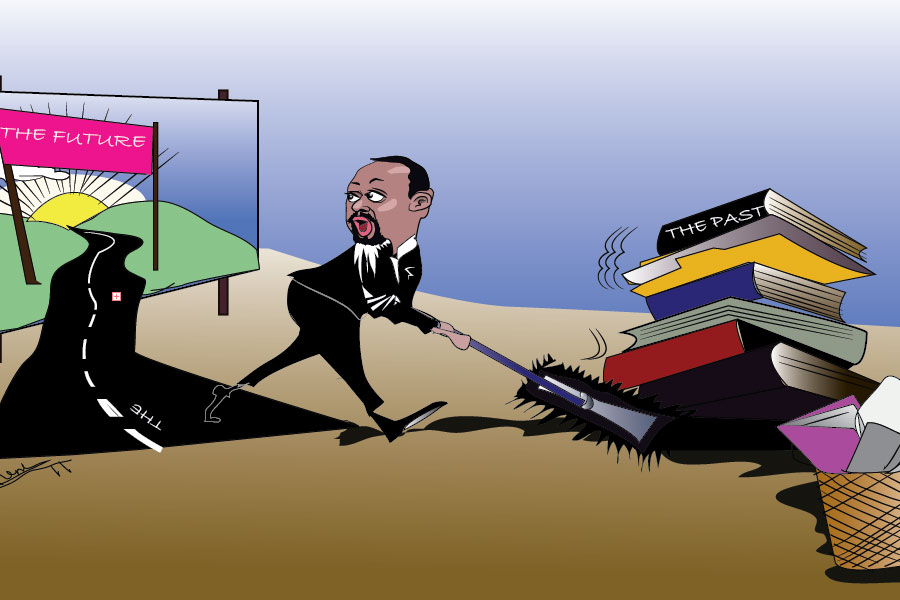
Verbatim | Nov 07,2020
Oct 7 , 2023.
Addis Abeba found itself the recipient of unexpected benevolence from Europe lately, with two pieces of news that should have warmed the hearts of the senior echelons of Prime Minister Abiy Ahmed’s (PhD) government.
Ahmed Shide, his finance minister, had been engaged in talks with a high-ranking European diplomat touring East Africa. The pinnacle of these discussions was the signing of an agreement with Jutta Urpilainen, European Union (EU) Commissioner for International Cooperation. This saw a commitment to resume direct budgetary support to Ethiopia, amounting to 650 million euros.
This financial aid, once suspended in the wake of the civil war in northern Ethiopia between the federal government, the forces it assembled, and Tigray Regional State, is part of a much larger one-billion-euro package earmarked for the period spanning 2021 to 2027. This is loaves and fish for a country starved of foreign currency even to pay for essential imports.
However, as with all geopolitical manoeuvres, the crux often lies beneath the surface.
The European Commissioner puts conditions in a firm commitment from Ethiopia’s leaders to 'transitional justice' and 'accountability' concerning the alleged war crimes perpetrated against civilians during the intense two-year conflict. Still, Urpilainen’s diplomatic overtures have struck a chord in Addis Abeba, signalling a potential 'normalisation' of EU-Ethiopia ties, strained since November 2020.
For Prime Minister Abiy, Urpilainen’s visit and her mollifying remarks have solidified his belief that their "strategic partnership" is on the mend. This feeling of diplomatic warmth from Brussels was compounded by the EU’s unusual reluctance to back the extension for the United Nations investigative commission into human rights violations during the war.
The UN Human Rights Council, headquartered in Geneva, recently found itself at odds when it failed to extend the tenure of the International Commission of Human Rights Experts on Ethiopia. Chaired by the esteemed Tanzanian lawyer and human rights advocate Mohamed Othman, this Commission had been tasked with investigating allegations of rights violations since the war’s commencement on November 3, 2020.
The Entebbe-based Commission has been vocal, releasing no less than 10 public statements in three years, including a recent comprehensive report. It accuses all warring parties of a plethora of crimes, ranging from mass killings and rape to the wanton destruction of educational and medical facilities. They have detained thousands unlawfully and displaced millions from their homes.
None of the parties in the conflict - bar Eritrean leaders - have dismissed these allegations off mark. The authorities in Addis Abeba, Meqelle, Bahir Dar and Semera acknowledge that forces under their command committed atrocities, albeit with variations in magnitude and detail. The consensus seems clear: for a deeply divided society like Ethiopia’s to move on, there must be accountability, reconciliation, and healing.
The thorny issue, though, is determining who will oversee these investigations and administer what is widely termed as “transitional justice.”
A working group, formulated in Addis Abeba and comprising experts from the Ministry of Justice, has been entrusted with chalking out a transitional justice policy. Yet, with the process exclusively under the federal government’s purview, scepticism abounds. This should be of no surprise.
Transitional justice should not be just retrospective but more about shaping the future. In a country rife with division like Ethiopia, it must serve as a gateway to forging a fair political community and an inclusive economic order. Countries that have successfully trodden this path stand as beacons of hope for others in the throes of strife and discord.
The need for an impartial and credible system to address human rights violations and promote reconciliation is vital.
Ethiopia remains scarred by unresolved historical conflicts. Prior attempts at promoting an inclusive and accountable system have been, for the most part, underwhelming. Efforts to bridge historical schisms and offer victims a platform for voicing their grievances often fell victim to the biases they sought to eradicate, perpetuating feelings of disenfranchisement.
In a successful transitional justice, impartiality is sacrosanct. Ensuring fairness and inclusivity for all stakeholders is crucial to focusing on truth, justice, and reparations, rather than pursuing the righteousness of the victor. For countries like Ethiopia, with a deeply rooted institutional distrust, the significance of a credible transitional justice system is immeasurable.
Transparency, consistency, and adherence to internationally acknowledged norms form the bedrock of credibility. Here, past international undertakings can serve as guiding stars.
Although not without critics, South Africa’s post-apartheid Truth & Reconciliation Commission (TRC) stands out as a testament to the power of confronting a divisive past. The Commission’s emphasis on truth, reconciliation, reparations, and conditional amnesty created a way for victims and perpetrators to address historical grievances.
Germany’s post-World War II transformation offers another instructive tale. A dogged resolve to reckon with its National Socialist Party (Nazi) past, through rigorous legal mechanisms and societal reflection, enabled Germany’s society to emerge from the shadows of its history.
While such international examples illuminate potential paths, the onus should be on Ethiopia’s leaders to initiate a political dialogue, aiming for a negotiated settlement of differences that led to the wars. A dialogue with the federal government the authorities in Tigray provisional administration have recently advocated, echoing a sentiment that has long been due, should deserve proper attention.
Ethiopia’s current societal fabric is fraught with entrenched demographic tensions, widespread mistrust in its institutions, and political degeneration. A recent UN Human Rights Commission statement added to these concerns. The Commission cautioned that rights violations are destined to persist without independent probes and an international oversight mechanism.
The report paints a bleak picture, highlighting the myriad risk factors for future crimes in Ethiopia, from ongoing violations and instability to deep-seated impunity. This dire prognosis can serve as a wake-up call for the international community, particularly those who once vowed “never again”.
Regrettably, geopolitics often trumps humanitarianism. Policymakers, primarily in Washington D.C. and Brussels, seem to have prioritised countering the rising challenge from assertive and illiberal countries over safeguarding human lives.
The Europeans, it seems, are willing to keep the Ethiopian state intact, potentially to curb refugee inflows, even if it means compromising their lofty human rights ideals. They appear to have come to terms with the derelictions of duty to protect those fallen victims in the name of state sovereignty.
It remains to be seen if Europe’s painful tradeoff on Ethiopia will pay off.
PUBLISHED ON
Oct 07,2023 [ VOL
24 , NO
1223]

Verbatim | Nov 07,2020

Commentaries | Apr 28,2024

Editorial | Feb 01,2019

Editorial | Sep 27,2025

Verbatim | Jun 04,2022

Radar | Apr 03,2021

Fineline | Jul 13,2019

Fortune News | Jun 19,2021

Radar | Jul 01,2023

View From Arada | Jun 01,2019

Photo Gallery | 177752 Views | May 06,2019

Photo Gallery | 167965 Views | Apr 26,2019

Photo Gallery | 158660 Views | Oct 06,2021

My Opinion | 137005 Views | Aug 14,2021

Dec 22 , 2024 . By TIZITA SHEWAFERAW
Charged with transforming colossal state-owned enterprises into modern and competitiv...

Aug 18 , 2024 . By AKSAH ITALO
Although predictable Yonas Zerihun's job in the ride-hailing service is not immune to...

Jul 28 , 2024 . By TIZITA SHEWAFERAW
Unhabitual, perhaps too many, Samuel Gebreyohannes, 38, used to occasionally enjoy a couple of beers at breakfast. However, he recently swit...

Jul 13 , 2024 . By AKSAH ITALO
Investors who rely on tractors, trucks, and field vehicles for commuting, transporting commodities, and f...

Oct 25 , 2025 . By YITBAREK GETACHEW
Officials of the Addis Abeba's Education Bureau have embarked on an ambitious experim...

Oct 26 , 2025 . By YITBAREK GETACHEW
The federal government is making a landmark shift in its investment incentive regime...

Oct 27 , 2025
The National Bank of Ethiopia (NBE) is preparing to issue a directive that will funda...

Oct 26 , 2025 . By SURAFEL MULUGETA
A community of booksellers shadowing the Ethiopian National Theatre has been jolted b...